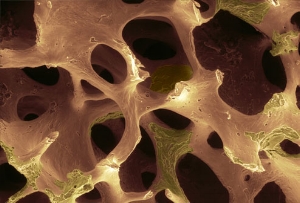Osteoporosis Medications (Bisphosphonates)
Example of bone osteoporosis
Dr. Redfern is deeply involved in treatment of and research about the effects of Bisphosphonate medications on the mouth and jaw bones. He believes that these medications may also be causing severe problems with the temporomandibular joint or TMJ. Bisphosphonates are valuable medications that help prevent hip/vertebral fractures, resist the spread of and pain from cancers and help those with osteoporosis live better lives. These drugs include Actonel, Boniva and Fosamax, taken orally, as well as Aredia, Reclast and Zometa, taken IV.
All medications have side effects. We need to be able to deal with these side effects to prevent serious problems. The percentage of people who suffer the side effect of BRONJ (Bisphosphonate Related or Induced Osteonecrosis of the Jaw) is small, but reports are increasing rapidly. These conditions are also referred to as DIONJ (Drug Induced Osteonenecrosis of the Jaw) and MIONJ (Medically Induced Osteonecrosis of the Jaw). Be sure to discuss the potential effects of Bisphosphonates on your mouth and jaw with your medical doctor and dentist before starting to take any of the Bisphosphonate medications. Preventive measures can be taken to help reduce the chances of suffering with potentially debilitating jaw or oral lesions (bone death or osteonecrosis) caused by Bisphosphonates.
Similar to what is done to evaluate osteonecrosis of other long bones of the body, imaging modalities including computed tomography (CT and CBCT) types of cat scans) and magnetic resonance imaging (MRI) are being used to evaluate the potential or existing osteonecrosis stages in the mandible and maxilla. The use of these tests for the study of Bisphosphonate Induced Osteonecrosis of the Jaw is still evolving. The CT, CBCT and MRI should be and are being used for early diagnosis and prevention.
